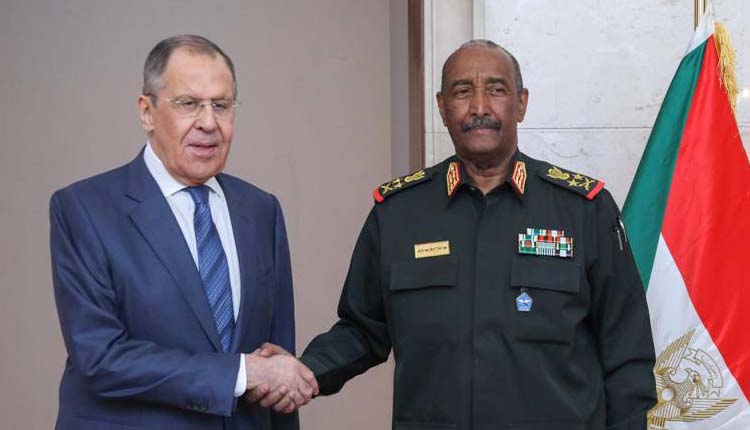Sudan ex-FM: ‘Diplomatic pivot to Russia and Iran signals deepening isolation’

Chairman of Sudan's Transitional Sovereignty Council Lt Gen Abdelfattah El Burhan meets the Russian Foreign Affairs Minister Sergey Lavrov in Khartoum, February 9, 2023 (File photo: Sudan's Transitional Sovereignty Council)
Sudan’s Foreign Minister, Ali Yousef, has praised Iran’s support for Sudan during an official visit to Iran’s capital of Tehran yesterday, just days after securing a deal in Moscow to establish a Russian base on the Red Sea.
The recently appointed foreign minister’s diplomatic manoeuvres have sparked sharp reactions, with both the Communist Party of Sudan and the mainstream Arab Socialist Ba’ath Party issuing statements rejecting the proposed Russian military base.
The Sudanese Armed Forces (SAF) growing ties with Russia and Iran come as it intensifies combat operations, recently reclaiming Sennar and El Gezira states while advancing in North Kordofan, Khartoum North (Bahri), Omdurman, and parts of Khartoum.
Former Sudanese Minister of Foreign Affairs Ibrahim Ayoub, speaking to Radio Dabanga, described the government’s outreach to Russia, Iran, Egypt, and Germany as a sign of its deepening international isolation.
“The military regime in Port Sudan is desperate to secure arms to sustain the civil war. Russia and Iran, as key arms exporters, are willing suppliers, though at a price,” he said.
He argued that Sudan’s pivot towards Moscow and Tehran follows its recently “cooling ties” with Turkey, due to shifting regional dynamics, particularly in Syria.
Meanwhile, China appears to be waiting to see how US policy evolves before committing to Sudan’s fragile regime.
“The actions of Foreign Minister Ali Yousef resemble confusion rather than a coherent foreign policy,” Ayoub added.
Speaking at the humanitarian conference on Sudan in Addis Ababa on Friday, UN Secretary-General António Guterres warned of the continued flow of weapons into the country.
The SAF, along with international actors, has repeatedly accused the UAE of arming the paramilitary Rapid Support Forces (RSF) in the ongoing conflict.
‘Russia’s naval ambitions in Sudan’
Commenting on Yousef’s Moscow visit, Ayoub said the foreign minister sought to reassure Russian officials that Sudan’s commitment to the Red Sea naval base remains firm. However, Russia’s Foreign Minister declined to comment when pressed by journalists, a move Ayoub interpreted as an attempt to gauge the response of the new US administration.
“The Sudanese government is following the same playbook as former President Omar Al Bashir seeking Russian backing to stay in power after losing regional allies,” he said.
Former Sudanese Ambassador to Lebanon, Jamal Ibrahim, criticised Yousef’s public remarks about the Russian base agreement, arguing that such matters should be handled discreetly. “These are issues of national security and should not be disclosed in the media,” he said.
Ibrahim warned that the foreign minister’s visits to Moscow and Tehran risk exacerbating tensions. “At a time when efforts are being made to de-escalate the conflict in Sudan, these moves could stir further unrest,” he said.
With international attention largely focused on the Israel-Gaza crisis, Sudan’s diplomatic realignment could have significant consequences. Iran and Russia, both long-time backers of Syria’s former President Bashar Al Asad, have been deepening their ties with Sudan over the past year.
According to sources, Iran has proposed establishing a helicopter carrier on Sudan’s Red Sea coast, an offer the SAF have yet to accept. Analysts at the Robert Lansing Institute suggest that Sudan may become more receptive to the idea as the war drags on.











 and then
and then